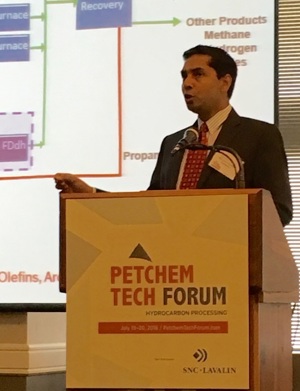Petchem Tech Forum: Dow Chemical opens Day Two with a discussion on propylene

Hydrocarbon Processing’s inaugural Petchem Tech Forum began its second day with a keynote presentation from Dow Chemical. Manov Lahoti, commercial director for US olefins for Dow Chemical, provided an overview on global propylene market dynamics, as well as an overview of Dow Chemical’s new PDH unit and processing technology. According to Dow Chemical, on-purpose propylene demand growth will average 2%-3%/yr through 2035. Between 2016 and 2035, propylene demand is forecasted to outgrow production capacity. By 2020, propane hydrogenation (PDH) will account for 15% of new propylene capacity. The majority of new PDH capacity will be located in Asia. Dow hopes to capitalize on this supply gap with its fluidized catalytic dehydrogenation (FCdh) technology.
Dow Chemical’s FCdh technology evolved from a process that was originally developed for ethylene and styrene. The technology was then adopted to PDH. Mr. Lahoti explained some of the key advantages of FCdhtechnology over leading PDH technologies. Those advantages include:
- Smaller compressor size due to higher conversion and no recycle of hydrogen
- Less reaction equipment
- Fewer feed impurities removal requirements due to catalyst stability
- Smaller initial catalyst load due to fluidization technology
- Lower precious metal loadings on catalyst
These advantages are expected to deliver 25%-50% lower capital costs.
Operational advantages of Dow’s FCdh technology include:
- Higher conversion and no recycle of hydrogen
- Reduced vapor residence time at temperature resulting in higher selectivity
- Catalyst can be changed out on line
- Lower precious metal loadings on catalyst
The operational advantages are expected to deliver 10%-20% lower operating costs.
Dow Chemical completed its PDH plant in Freeport, Texas in November 2015. The 750 Mtpy Oyster Creek plant is the second PDH plant to be built in the US. The facility utilizes propane to produce polymer grade propylene. The project is part of Dow Chemical’s Project Gulfstream.
The Petchem Tech Forum concludes today. For more information regarding Hydrocarbon Processing’sinaugural petrochemical event, visit the Hydrocarbon Processing website.






Comments